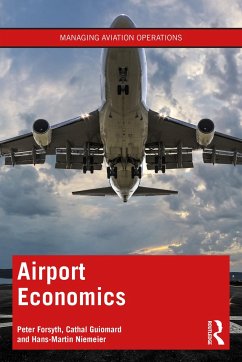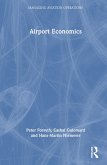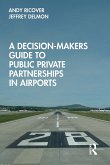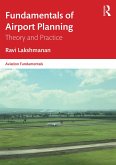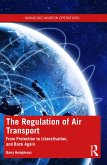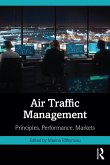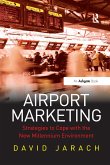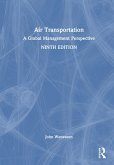This book provides a comprehensive guide to the economics of airports for all managers, regulators and educators within the aviation industry. Written by three renowned experts but made accessible and relevant for all those working within the industry, or aspiring to do so, it is the perfect entry point for learning about the underlying economics of airports as a crucial component of the air transport system. It explains the cost structures of airports and then relates these to how airports determine their charges.
It explains how charges at different airports vary, whether this is due to different types of traffic, different input prices, ways of producing outputs or different levels of efficiency. Most airports are publicly owned or regulated, and there has been a trend towards privatisation. The book explains how airports have been regulated and assesses how well the regulatory structures have performed; it discusses the trend towards light-handed regulationand the reliance on competition where this exists. The book examines the problems of limited capacity at airports and how these are resolved through slots and charging systems, and the long-term solution of investment in airports-why it is controversial, and how it can be achieved effectively. It also considers the environmental impacts of airports and the issues these pose for managers, from the well-known problems of airport noise to the growing recognition of the impacts of air transport on climate change, and the roles airports play in mitigating these consequences.
Written for airport and airline managers, regulators and students, this book will suit Bachelor's and Master's programmes on air transport management.
It explains how charges at different airports vary, whether this is due to different types of traffic, different input prices, ways of producing outputs or different levels of efficiency. Most airports are publicly owned or regulated, and there has been a trend towards privatisation. The book explains how airports have been regulated and assesses how well the regulatory structures have performed; it discusses the trend towards light-handed regulationand the reliance on competition where this exists. The book examines the problems of limited capacity at airports and how these are resolved through slots and charging systems, and the long-term solution of investment in airports-why it is controversial, and how it can be achieved effectively. It also considers the environmental impacts of airports and the issues these pose for managers, from the well-known problems of airport noise to the growing recognition of the impacts of air transport on climate change, and the roles airports play in mitigating these consequences.
Written for airport and airline managers, regulators and students, this book will suit Bachelor's and Master's programmes on air transport management.
"One of the key strengths of the book is in discussing how recognised economic theory relates to airports but at the same time balancing debates about major issues that are particularly relevant to the airport industry today. These include long-term traffic forecasting accuracy, slot allocation, incentives for investment, interactions between aeronautical and non-aeronautical areas and the choice of till, performance measurement challenges, decarbonisation strategies, economic impact measurement and the effect of COVID-19. A novel approach is the identification of a major controversy in each chapter which is examined through discussions of the relevant issues. The book also has case studies and numerous examples which illustrate and support many of the arguments that are developed in the book by linking theory and practice.
The book will be of interest to practitioners working in the airport industry but also to other air transport sectors, especially airlines. Its insights will be invaluable for informing regulation and government policy. Moreover, it will be ideal for academics, researchers and students by providing in-depth coverage of key airport economic issues in one accessible text."
Anne Graham, Westminster University, UK
"Airport Economics is a must read for the beginner and for the expert. The former will find a scholarly, yet highly readable presentation not only of 'traditional' topics, such as airport demand, costs and pricing, but also of more 'contemporary' ones, such as airport ownership, efficiency, regulation and environmental and social impacts. And the expert will appreciate the comprehensive and thoughtful critical reviews of the numerous related issues and solution approaches provided by Professors Forsyth, Guiomard and Niemeier. Features that this reader particularly enjoyed include: a plethora of insightful real-world examples; the book's decidedly international perspective; the brief case studies that are interspersed throughout the text; and, best of all, the 'controversies' that are introduced at the end of each chapter - e.g., 'are private, lightly regulated airports ripping off airlines and passengers?' - that motivate the reader to re-consider and synthesize the points that the chapter discussed."
Amedeo Odoni, T. Wilson Chair Professor Emeritus, MIT
"Air transport is distinguished, not just by providing rapid connections between cities, but also by the sheer scale of distortions in many of its markets. The pricing of airport services developed largely on cost recovery and cross-subsidy, with landing fees often determined by how much shopping takes place at the airport, exacerbating demand for scarce landing slots. Environmental externalities are not remotely paid for. Capacity expansion is no better than pricing. It is 55 years since the Roskill Commission issued their thoughtful and pioneering report on London's airport capacity needs. They were ignored. Poor government decision making on airports has so often resulted from adversarial politics, the tyranny of the minority, concern for newspaper headlines and, most importantly, bogus quantification that provides endless numbers but no insight. This much needed book on the economics of airports is full of insights. It should be essential reading for all those in government, regulators and the industry concerned to make rational decisions about the future development of an industry that plays such an important role in connecting cities at home and around the world."
Brian Pearce, Former Chief Economist, IATA
The book will be of interest to practitioners working in the airport industry but also to other air transport sectors, especially airlines. Its insights will be invaluable for informing regulation and government policy. Moreover, it will be ideal for academics, researchers and students by providing in-depth coverage of key airport economic issues in one accessible text."
Anne Graham, Westminster University, UK
"Airport Economics is a must read for the beginner and for the expert. The former will find a scholarly, yet highly readable presentation not only of 'traditional' topics, such as airport demand, costs and pricing, but also of more 'contemporary' ones, such as airport ownership, efficiency, regulation and environmental and social impacts. And the expert will appreciate the comprehensive and thoughtful critical reviews of the numerous related issues and solution approaches provided by Professors Forsyth, Guiomard and Niemeier. Features that this reader particularly enjoyed include: a plethora of insightful real-world examples; the book's decidedly international perspective; the brief case studies that are interspersed throughout the text; and, best of all, the 'controversies' that are introduced at the end of each chapter - e.g., 'are private, lightly regulated airports ripping off airlines and passengers?' - that motivate the reader to re-consider and synthesize the points that the chapter discussed."
Amedeo Odoni, T. Wilson Chair Professor Emeritus, MIT
"Air transport is distinguished, not just by providing rapid connections between cities, but also by the sheer scale of distortions in many of its markets. The pricing of airport services developed largely on cost recovery and cross-subsidy, with landing fees often determined by how much shopping takes place at the airport, exacerbating demand for scarce landing slots. Environmental externalities are not remotely paid for. Capacity expansion is no better than pricing. It is 55 years since the Roskill Commission issued their thoughtful and pioneering report on London's airport capacity needs. They were ignored. Poor government decision making on airports has so often resulted from adversarial politics, the tyranny of the minority, concern for newspaper headlines and, most importantly, bogus quantification that provides endless numbers but no insight. This much needed book on the economics of airports is full of insights. It should be essential reading for all those in government, regulators and the industry concerned to make rational decisions about the future development of an industry that plays such an important role in connecting cities at home and around the world."
Brian Pearce, Former Chief Economist, IATA

